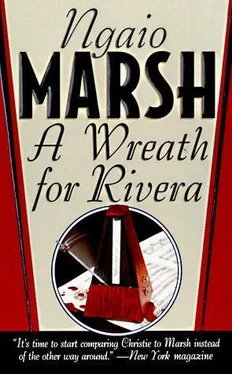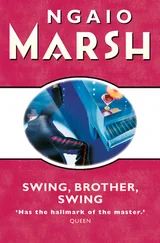“Not enormously,” said Carlisle, and bent over her aunt’s embroidery. “It’s lovely, darling,” she said. “How do you do it?”
“You shall have it for an evening bag. I have been telling Edward that I fling myself on his charity, and,” Lady Pastern added in a stormy undertone, “and on yours, my dearest child.” She raised her needlework as if to examine it and they saw her fingers fumble aimlessly across its surface. “You see, both of you, this atrocious person. I implore you — ” Her voice faltered. “Look,” she whispered, “look now. Look at him.”
Carlisle and Edward glanced furtively at Mr. Rivera, who was in the act of introducing a cigarette into a jade holder. He caught Carlisle’s eye. He did not smile but glossed himself over with appraisement. His eyes widened. “Somewhere or other,” she thought, “he has read about gentlemen who undress ladies with a glance.” She heard Manx swear under his breath and noted with surprise her own gratification at this circumstance. Mr. Rivera advanced upon her.
“Oh, Lord!” Edward muttered.
“Here,” said Lady Pastern loudly, “is Hendy. She is dining with us. I had forgotten.”
The door at the far end of the drawing-room had opened and a woman plainly dressed came quietly in.
“Hendy!” Carlisle echoed. “I had forgotten Hendy,” and went swiftly towards her.
Miss Henderson had been Félicité‘s governess and had remained with the family after she grew up, occupying a post that was half-way between that of companion and secretary to both Félicité and her mother. Carlisle called her controller-of-the-household and knew that many a time she had literally performed the impossible task this title implied. She was a greyish-haired woman of forty-five; her appearance was tranquil but unremarkable, her voice pleasant. Carlisle, who liked her, had often wondered at her faithfulness to this turbulent household. To Lady Pastern, who regarded all persons as neatly graded types, Miss Henderson was no doubt an employee of good address and perfect manners whose presence at Duke’s Gate was essential to her own peace of mind. Miss Henderson had her private room where usually she ate in solitude. Sometimes, however, she was asked to lunch or dine with the family; either because a woman guest had slipped them up, or because her employer felt it was suitable that her position should be defined by such occasional invitations. She seldom left the house and if she had any outside ties, Carlisle had never heard of them. She was perfectly adjusted to her isolation and if she was ever lonely gave no evidence of being so. Carlisle believed Miss Henderson to have more influence than anyone else with Félicité, and it struck her now as odd that Lady Pastern should not have mentioned Hendy as a possible check to Mr. Rivera. But then the family did not often remember Hendy until they actually wanted her for something. “And I myself,” Carlisle thought guiltily, “although I like her so much, had forgotten to ask after her.” And she made her greeting the warmer because of this omission.
“Hendy,” she said, “how lovely to see you. How long is it? Four years?”
“A little over three, I think.” That was like her. She was always quietly accurate.
“You look just the same,” said Carlisle, nervously aware of Mr. Rivera close behind her.
Lady Pastern icily performed the introductions. Mr. Bellairs bowed and smiled expansively from the hearth-rug. Mr. Rivera, standing beside Carlisle, said: “Ah, yes, of course. Miss Henderson.” And might as well have added: “The governess, I believe.” Miss Henderson bowed composedly and Spence announced dinner.
They sat at a round table, a pool of candlelight in the shadowed dining-room. Carlisle found herself between her uncle and Rivera. Opposite her, between Edward and Bellairs, sat Félicité. Lady Pastern, on Rivera’s right, at first suffered his conversation with awful courtesy, presumably, thought Carlisle, in order to give Edward Manx, her other neighbour, a clear run with Félicité. But as Mr. Bellairs completely ignored Miss Henderson, who was on his right, and lavished all his attention on Félicité herself, this manoeuvre was unproductive. After a few minutes Lady Pastern engaged Edward in what Carlisle felt to be an extremely ominous conversation. She caught only fragments of it as Rivera had resumed his crash tactics with herself. His was a simple technique. He merely turned his shoulder on Lady Pastern, leant so close to Carlisle that she could see the pores of his skin, looked into her eyes and, with rich insinuation, contradicted everything she said. Lord Pastern was no refuge as he had sunk into a reverie from which he roused himself from time to time only to throw disjointed remarks at no one in particular, and to attack his food with a primitive gusto which dated from his Back-to-Nature period. His table manners were defiantly and deliberately atrocious. He chewed with parted lips, glaring about him like a threatened carnivore, and as he chewed he talked. To Spence and the man who assisted him and to Miss Henderson, who accepted her isolation with her usual composure, the conversation must have come through like the dialogue in a boldly surrealistic broadcast.
“… such a good photograph, we thought, Edward, of you and Félicité at the Tarmac. She so much enjoyed her party with you…”
“… but I’m not at all musical…”
“… you must not say so. You are musical. There is music in your eyes — your voice…”
“… now that’s quite a nifty little idea, Miss de Suze. We’ll have to pull you in with the boys…”
“… so it is arranged, my dear Edward.”
“… thank you, Cousin Cécile, but…”
“… you and Félicité have always done things together, haven’t you? We were laughing yesterday over some old photographs. Do you remember at Clochemere…?”
“… Gee, where’s my sombrero?”
“… with this dress you should wear flowers. A cascade of orchids. Just here. Let me show you…”
“… I beg your pardon, Cousin Cécile, I’m afraid I didn’t hear what you said…”
“Uncle George, it’s time you talked to me…”
“Eh? Sorry, Lisle, I’m wondering where my sombrero…”
“Lord Pastern is very kind in letting me keep you to myself. Don’t turn away. Look, your handkerchief is falling.”
“ Damn! ”
“Edward!”
“I beg your pardon, Cousin Cécile, I don’t know what I’m thinking of.”
“Carlos.”
“… in my country, Miss Wayne… no, I cannot call you Miss Wayne. Car-r-r-lisle! What a strange name… Strange and captivating.”
“Carlos!”
“Forgive me. You spoke?”
“About those umbrellas, Breezy.”
“Yes, I did speak.”
“A thousand pardons, I was talking to Carlisle.”
“I’ve engaged a table for three, Fée. You and Carlisle and Ned. Don’t be late.”
“My music to-night shall be for you.”
“I am coming also, George.”
“ What !”
“Kindly see that it is a table for four.”
“ Maman ! But I thought…”
“You won’t like it, C.”
“I propose to come.”
“Damn it, you’ll sit and glare at me and make me nervous.”
“Nonsense, George,” Lady Pastern said crisply. “Be good enough to order the table.”
Her husband glowered at her, seemed to contemplate giving further battle, appeared suddenly to change his mind and launched an unexpected attack at Rivera.
“About your being carried out, Carlos,” he said importantly. “It seems a pity I can’t be carried out too. Why can’t the stretcher party come back for me?”
“Now, now, now,” Mr. Bellairs interrupted in a great hurry. “We’ve got everything fixed, Lord Pastern, now, haven’t we? The first routine. You shoot Carlos. Carlos falls. Carlos is carried out. You take the show away. Big climax. Finish. Now don’t you get me bustled,” he added playfully. “It’s good and it’s fixed. Fine. That’s right, isn’t it?”
Читать дальше






